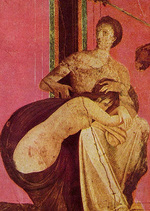Classics offers insights into human condition
 Classics Classics
One of the University of Adelaide's most outstanding researchers, Professor Han Baltussen, has been appointed to the Hughes Chair in Classics. The prestigious appointment - it is one of only three foundation chairs established by Sir Walter Watson Hughes in 1874 - has been empty since 1992 when it was vacated by the 8th incumbent, Robert Ussher. Professor Baltussen is the recipient of two ARC Discovery Grants totalling $320,000 in the past four years to undertake projects dealing with important questions of human life and society. In 2007 he was awarded Federal Government funding for a three-year project to investigate the strategies employed by ancient civilisations to deal with grief, loss and bereavement and apply it to a modern context. "We can learn from the human experience over past centuries, no matter how far back we go," said Professor Baltussen. "It is interesting to note that grief counsellors are increasingly using methods from literature and theatre, as part of today's coping mechanisms." His project, which is near completion, shows how past civilisations coped with grief in different ways. The study makes use of letters and other writings that reflect on the human condition and offer several different types of consolation for those who have suffered loss. It has also produced new insights into the grief of some famous individuals, including Greek and Roman philosophers Cicero, Plutarch and emperor Marcus Aurelius. In a second ARC Discovery project awarded this year, Professor Baltussen will look at how ancient civilisations balanced the individual's right to free speech with the public good. "While the censorship practised in countries like China and Iran is notorious, even States with a constitutional commitment to freedom of speech impose limits on that freedom; nowhere is the right absolute," he said. "The arrival of the internet has made the perennial issue of how to balance the right to free speech against other legitimate concerns more acute, resulting in an explosion of interest in the issue of censorship." Professor Baltussen will spend the next three years working on this project with Visiting Research Fellow in Classics Associate Professor Peter Davis, researching ancient censorship and extracting lessons for the modern age. "We would argue that censorship is as much of a philosophical or cultural problem as it is a technological one," Professor Baltussen said. Professor Baltussen has made significant contributions to teaching and research within the Discipline of Classics since joining the University of Adelaide in 2002. In 2010 he was named the "Most Outstanding Researcher" in the Faculty of Humanities and Social Sciences and appointed the Hughes Professor of Classics in September this year. Story by Candy Gibson
|






